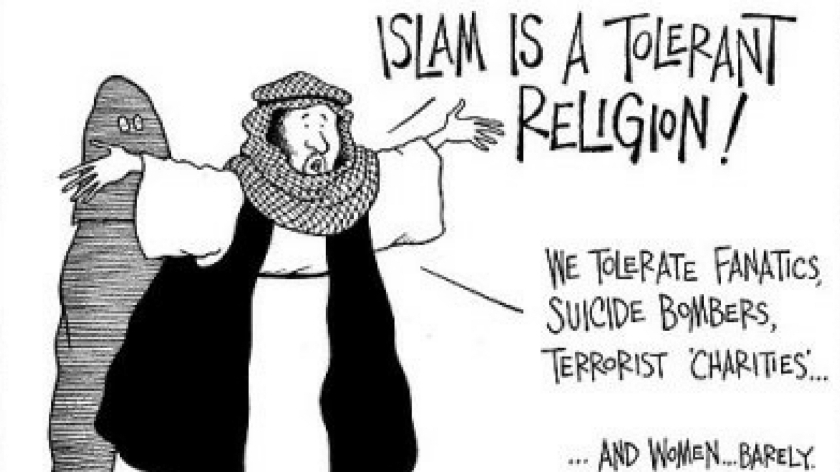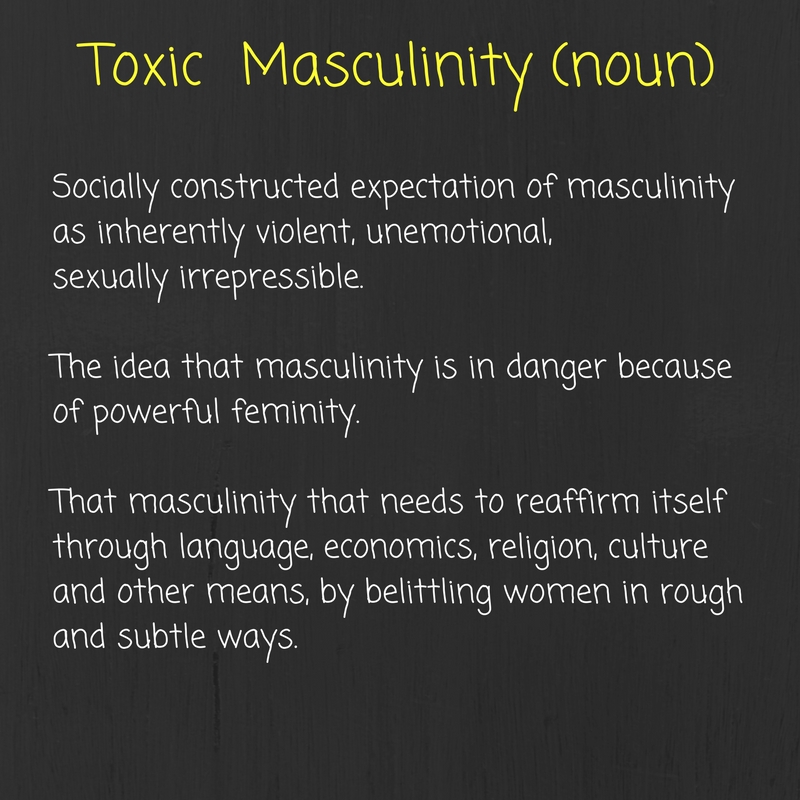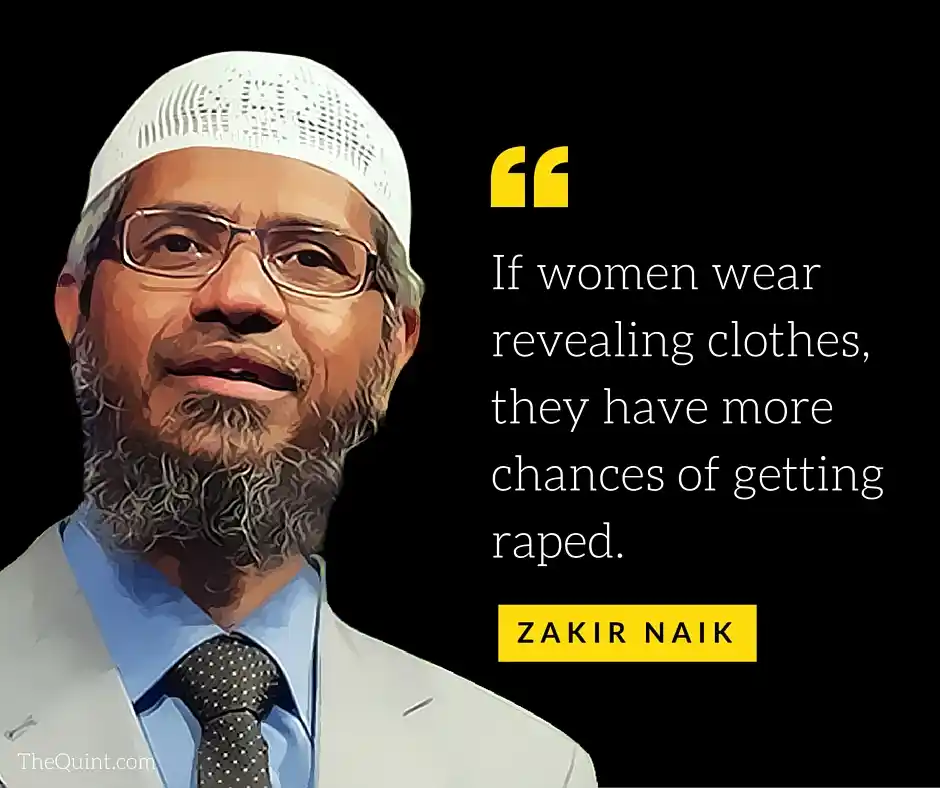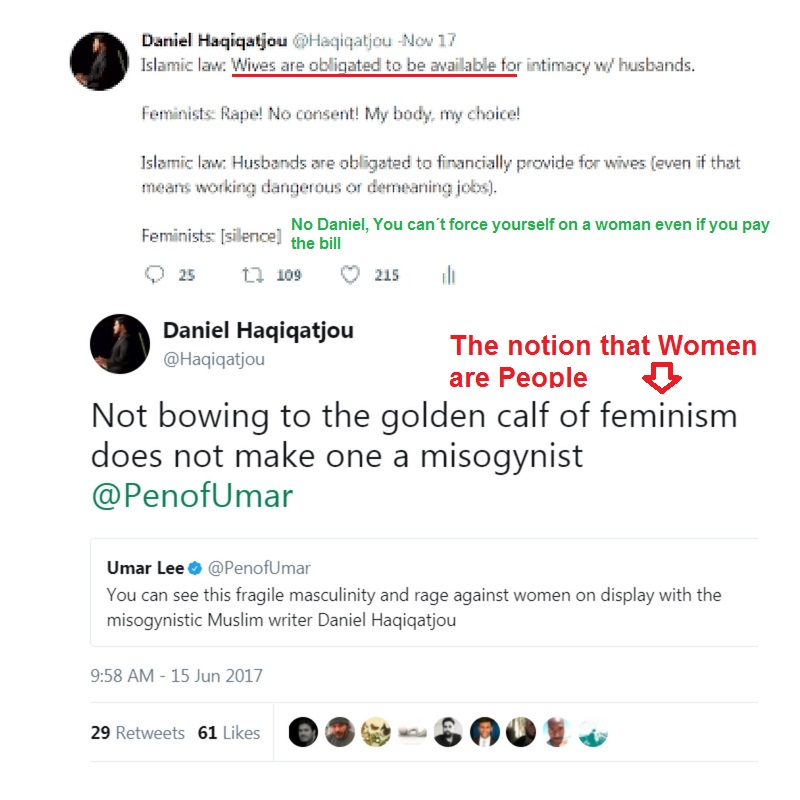
Excuse me, but I thought you should know your misogyny is showing.
I have read with deep interest the article written by Ayesha Fakie and Khadija Bawa entitled: Dear Indian Muslim Men: We Need To Talk published by Huffington Post South Africa on March 7th of this year. I would like to add my two cents to this conversation, one that I believe is relevant and very necessary that we address as a community with genuine sincerity and accountability.
The text of Ayesha and Khadija is a critical piece of the masculinity model that is predominant in Muslim Indian communities. Their criticism is quite accurate. The situations that they give as examples of male chauvinism, are part of the reality for many Muslim women who have to endure a male supremacy made up of attitudes and behaviors that constitute violence on a variety of levels:
“Worse, women who perform most of their labour in the home are erased even further. No one asks them anything beyond family and kids; their opinions on politics or global affairs is assumed to be absent, irrelevant or nonsensical.”

Ayesha and Khadija mention racism as an important component of male supremacy and they directly connect this to the treatment Muslim Indian men give to “colored or black domestic workers”. I would like to add black and colored Muslim women as well as non-white converted women. As a Latina Muslim, I have experienced racism and belittling due to my ethnicity and culture, I am not always viewed as being good enough to be a match for an Indian man (even if this man has less education, religious wisdom and integrity than me).
Some Muslim men may not see themselves as chauvinists, but as the authors of Dear Indian Muslim Men say: “the larger trend stands, and you need to address it,” as believing men you need to stand up against injustice. The problem is serious enough that it cannot be ruled out with a simple #NotAllIndian or #NotAllIndianMen. If we speak within the framework of Islamic ethics, only one oppressive situation experienced for only one woman is enough to make it too much.
Although, it is true… #NotAllIndianMen … the issue is worse than this, and still needs to be addressed.
This strand of misogyny and male chauvinism is so widespread that it exceeds the limits of a particular community, it emerges in many Muslim communities. Islam as a whole has a problem with an hegemonic toxic masculinity and the belittling of women. These problems are supported by the authority of many interpretations that justify and validate as the “word of God” which are, in actuality, merely male opinions. These realities affect the relationship between genders and the development of the spirituality of Muslim women.
I wonder: How can men who call themselves Muslims can ignore the important role of women as political subjects, which is guaranteed them in the Qur’an and confirmed by the history of Islam? How can they be at peace with their faith, if they see women as servants and not as partners? However, these men intend to sell us the pill that they follow the life’s testimony of Prophet Muhammad (pbuh) who, as we know, celebrated, embraced and fostered the intelligence, wisdom, character of women, making them not only life partners, but also his advisors and even comrades in battle.

How do Muslim men like Daniel Haqiqatjou, Zakir Naik and others, have the nerve to call themselves believers, if they devote an important part of their lives to promoting and profiting largely from misogyny? Even Muslim men, who would call themselves feminist, engage in attitudes of subtle contempt that are the product of deep, but not always assumed, misogyny.
Those who criticize and demonize the West because of its influence on politics, culture and language in the societies of the Global South, have no problem in exercising a model of masculinity that has no basis in the tenets of Islam but, is linked profoundly and clearly in a Colonial, Imperialist and Christian-European White-Centered model. The same ones who reject the “White Man” are every day, at every moment, wanting to be like him.
Patriarchy does not distinguish races and no culture has the privilege of misogyny. While in South Africa a Muslim man is insulting his wife, a Sheikh in Rabat is offering a Khutba on how to beat a woman without leaving marks and a reverted Muslim in Latin America justifies that he has broken his wife’s nose, saying that the Qur’an gives him the right to do so.
 I ask believing men: What’s your Islam? It is an oxymoron to be a male chauvinist and a Muslim. If you claim to know that gender inequality, genital mutilation, child marriage, the servitude of women in the domestic sphere ARE NOT PART OF ISLAM: How can you pray next to, pay to listen to or attend Khutbas that put women’s oppressors among you? How can you say that you believe if you despise us? Why do you justify Islam with attitudes and behaviors that are merely your own?
I ask believing men: What’s your Islam? It is an oxymoron to be a male chauvinist and a Muslim. If you claim to know that gender inequality, genital mutilation, child marriage, the servitude of women in the domestic sphere ARE NOT PART OF ISLAM: How can you pray next to, pay to listen to or attend Khutbas that put women’s oppressors among you? How can you say that you believe if you despise us? Why do you justify Islam with attitudes and behaviors that are merely your own?
It is not us, Muslim women, who are in charge of reconciling your toxic masculinity with the teachings of Islam that center on equality, respect and compassion. You have to take accountability, if you say that you believe. It’s time for a deep, open and critical self- reflection on Masculinity in Islam. I do think after 1400 years, you’ve gathered enough courage to do it.
Vanessa Rivera de la Fuente is a specialist in training and community outreach in Gender, Communication and Interculturality. She’s also a learning and social projects designer and a qualitative researcher; an awarded activist for women’s rights who too does independent scholarship in Religion, Gender and Social Discourses. Nomadic writer. A woman with stories and geographies, lover of books, cats and spicy Chai.
An edited version of this column was published in Muslim Views, April’s Issue


I agreed with every word and thanks for providing a link to the letter to Indian muslim men article.
LikeLike
Thanks
LikeLike
Thank for exposing the TRUTH of Islam!
LikeLike
You ask such critically important questions exposing the hypocrisy of patriarchy as expressed in your culture – I ask the same questions as a not quite white – Indigenous woman. We all need to do the same.
Except for women who “dress” to be raped – how obscene – which blames women for misogyny – how does one sleep with that one? Disgusting. –
You expose the invisibility of women which makes them/us vulnerable to every kind of assault:
“Worse, women who perform most of their labour in the home are erased even further. No one asks them anything beyond family and kids; their opinions on politics or global affairs is assumed to be absent, irrelevant or nonsensical.”
Distressing brutally honest post.
LikeLike
Thanks Sarah and yes.. one wonder HOW?
LikeLike
Brava!!! Vanessa, you may be one of the bravest women on the planet. You love your religion, but you also correctly criticize its faults, especially the long history of toxic masculinity that blames women for their perils. The perils women face every day are unspeakable, yet you speak (or write) them. Would change ever be possible in the holy books and their preachers? Not just Islam, but the other two standard-brand religions, too?
LikeLike
Thanks Barbara. Yes, I think so. I think things are changing and they will change more.
LikeLike
P.S. Two of my physicians (an internist and the eye surgeon who did my cataract surgeries) are American Muslim men. They’re both tall and smart and, yes, sexy. If all Muslim men were like them, maybe the Middle East would be peaceful. Oh, yes, that’s a major-major-major stretch. But they’re both good examples of good men of any religion.
LikeLike
Interesting Barbara. I am not into Muslim men specially but I appreciate beauty wherever my eyes find it
LikeLike
ms. Rivera de la Fuente, i am glad that U view the rights of women as the equal of the rights of men. we are partners in the life of the human race, and we need every human being to succeed to maximize the success of civilization.
unfortunately, i must disagree with your statements about islam, which appears to be misogynistic to me; please correct me if i am wrong. here are are few not-so-nice things from islamic scripture.
• quran 4:11 and 4:176 say that a woman can only inherit half what a man can inherit;
• quran 2:282 says that a woman’s testimony in court is only worth half that of a man;
• quran 4:3 says a man may marry up to 4 women (yet sharia says a woman may only have 1 husband);
• sahih al-bukhari 6:301 relates muhammed saying that women are stupid and irreligious;0
• in sahih al-bukhari 2:28 and 54:464, muhammed says that he saw hell, and that it was filled with women;
• sahih al-bukhari 62:81 says that the most important thing a woman brings to a marriage is her private parts;
• abu dawud 2:704 reports that muhammed said that without a sutrah, a dog, a pig, a donkey, or a *woman* passing closer than a stone’s throw to the one praying invalidate’s the prayer.
there are *lots* more such scriptures, but i think these, coming from the quran and 2 of the sahih hadith collections, are enough to illustrate that muslim men who treat women badly are just fundamentalist muslims, doing what they are commanded by their scriptures. it is indeed vile, but this just means that these guys need to be shown that women are people who should have equal opportunity in all ways by simple virtue of the fact that they are *human* *beings*. it is the religion that is poisonous; the people can be (hopefully) fixed.
LikeLike
I am more than glad and fortunate to disagree with you, except in the point of Mrs. I am Miss Rivera de la Fuente, thanks.
LikeLike
Dear Mrs. Rivera de la Fuente,
I also applaud and wholeheartedly support your call for gender equality and mutual respect in not just Muslim societies but all cultures. However, I must respectfully point out that b.a. freeman is completely correct in identifying the fundamental misogyny that exists in Islamic doctrine. All his quotes are taken in proper context from the Koran or the Sahih Ahadith, which have influenced the treatment of women in Islamic societies for centuries via the four Sunni schools of Islamic jurisprudence (Hanafi, Hanbali, Maliki and Shafi’i). May I add that the Islamic sacred texts certainly do support female genital mutilation:
” Circumcision is obligatory (for every male and female) by cutting off the piece of skin on the glans of the penis of the male, but circumcision of the female is by cutting out the clitoris (this is called Hufaad).”
-Reliance of the Traveller: A Classic Manual of Islamic Sacred Law
Ahmad ibn Naqib al-Misri
“Narrated Umm Atiyyah al-Ansariyyah: A woman used to perform circumcision in Medina. The Prophet (peace be upon him) said to her: Do not cut severely as that is better for a woman and more desirable for a husband.”
-Sunan Abu Dawud 41:5251 (Note that the admonition isn’t not to cut, but rather not to cut severely.)
“Abu al- Malih ibn `Usama’s father relates that the Prophet said: “Circumcision is a law for men and a preservation of honour for women.”
-Ahmad Ibn Hanbal 5:75; Abu Dawud, Adab 167
As for child marriage, Muhammed himself set the example for this by marrying Aisha at age six and consummating the marriage when she was nine and he was 53. Since Muhammed is al Insan al Kamil (the perfect man) and Uswa Hasana (a beautiful model of conduct), his actions form much of the basis for Islamic law:
“Narrated ‘Aisha:
that the Prophet married her when she was six years old and he consummated his marriage when she was nine years old, and then she remained with him for nine years (i.e., till his death).”
– Sahih Al-Bukhari, Volume 7, Book 62, Number 64
These are but a few examples of canonical Islamic texts which definitively support all the chauvinistic attitudes and and often violent behaviours of many Muslim men toward women. Alas, your assertion that gender inequality is not part of Islam is misinformed and based on wishful thinking, which will do nothing to reform Islam in the ways that it must if Muslim women are to take their rightful place as equals in Islamic societies and Islam is to be a contributory part of the modern, interconnected world. I wish you the absolute best and success in your important work.
LikeLike
Here I’ve perpetuated your ‘Mrs.’ mis-identification! Miss Rivera de la Fuente it is, with sincere apologies.
LikeLike
Sorry I am here for discussion not for lessons. You can have your opinion but don´t dare to mansplaining and islamsplaining a Muslim Feminist.
LikeLike
Dear Miss Rivera de la Fuente.
I offered no opinions or lessons. I simply related verifiable facts, drawn directly from primary Islamic texts and sources of jurisprudence. I’m sorry that you chose to interpret my statements through a Muslim Feminist ideological lens, but when you give the doctrines of Islam a free pass and fail to hold the religion/ideology itself at least partly responsible for the way Muslim men treat women, you ensure that the problem will never be resolved.
As for “mansplaining and Islamsplaining”, these are terms designed to smear and denigrate and have no place in civil discourse. Perhaps if you actually posted my comment, your readers might be able to research my statements and decide for themselves whether or not they have merit. I challenge you to do so, in the spirit of the discussion you claim to support. Finally, I’ll “dare” to speak the truth to anyone, because everyone deserves to hear it.
Again, I wish you well.
LikeLike
Listen, I don´t educate men nor talk with them on Feminism. You mansplain me from the moment you start your opinion saying is THE TRUTH.. really you have something like that? because in that case humankind is losing a prophet. My time is precious and I’ve given you too much.
LikeLike
Dear Miss Rivera de la Fuente,
I apologize for taking your time, which I do realize is precious (as is mine). I would, however, like to clarify that I was using the word “truth” in reference to facts – verifiable Islamic scriptures and tafsirs which condone the misogynistic behaviours of some Muslim men. I was not claiming to be in possession of superior judgement, knowledge or values. If you can refute or debate my statements about Islamic theology and doctrine, fine. But jargon-laced personal attacks contribute nothing to a discussion and again, refusing to post my statement denies your readers the opportunity to decide for themselves.
I also find it interesting that your response to b.a. freeman (whose gender you don’t know) was far more polite and conciliatory than your replies to me, despite his/her harsher criticism of Islam and Muhammad. It seems that once you identified me as male (which, by the way, may not actually be the case…!) my ideas ceased to have any value. Does excluding men from the conversation really help foster dialogue and understanding, or does it just lead to separateness and resentment? Will excluding Muslim men make them more compassionate, introspective or loving?
LikeLike
I already said that I amnot interested in having a discussion under the base that someone here hold the TRUTH and other hold the TOTALLY MISTAKEN. The fact that you insist in pushing a conversation I already put boundaries about, is an evidence that no religion is necessary for the man who want to prove his entitlement on a woman, despite she already was clear on limits. That is patriarchy, male chauvinis and at the end is RAPE CULTURE. If you need a woman to explain her NO, whatever the case, you have to question why a NO is not enough, why I have to explain to you why I have the right to engage with you in a conversation or whatever and why you are so anxious to convince me that I don´t have the right to put limits just because as a HUMAN i have the RIGHT to do so. Check your mind set, it’s predatory and you’re dangerous if you don´t control it.
LikeLike
SOS ADMIN: TROLL ALERT
LikeLike
Hi b. a. freeman. Like Vanessa, I disagree strongly with your understanding of what Islam commands. You may interested in reading some of the exegetical works of Muslim feminists such as Amina Wadud, Fatima Mernissi, Orbala, and Nahida S. Nisa. There are many more but those can serve as a good start.
Richard, on the off chance you read this, I concede that it is possible that you simply didn’t realize how inappropriate you were being in telling Vanessa that you understand her religion better than she does and demanding she address interpretations you have posited as essential truth. Perhaps you believe that your comments were rooted in a sincere desire to understand how the interpretations you cite as truth may not be so. In that case, I would suggest you engage in some self-reflection and if you find yourself still left with questions about Islam, look into the works I recommended b. a. freeman. Please try to read them with an open mind and resist the impulse to respond to them the way you did to Vanessa.
I have no plans to return to this thread so I’ll say that you’re both welcome right now.
Vanessa, if I overstep in commenting here I sincerely apologize. I won’t continue this thread any further and would like to say that I appreciated your article. I’m also Muslim and these are thoughts I’ve had as well, without managing to articulate them as clearly and eloquently as you do here.
LikeLike
I’m very sad to admit the truth of your words, my whole 20 years perception of Islam have been shattered recently. But still many thanks for this eye-opening paragraphs
LikeLike
Reblogged this on lampmagician.
LikeLike
Hola vanessa no se si te acuerdas de mi, soy jara valen de Colombia me gustaría saber de ti regalarme si puedes un contacto, te recuerdo mucho y te extraño
LikeLike
Agregame https://www.facebook.com/vriveradelafuente
LikeLike